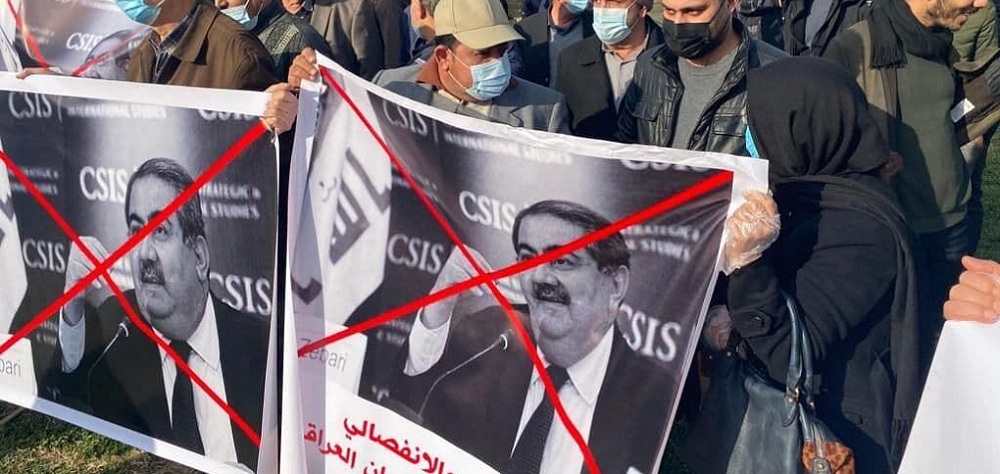Alwaght- Amid escalating tensions and a political crisis in Iraq, rulings issued by the Iraqi Federal Court in recent days have complicated the future of politics and governance in the country. As the country is facing legal vacuum because of the parliament failure to hold its sessions on February 7 and 8, the Federal Court in important decisions on Sunday extended Barham Salih presidency until a new president is elected and banned Hoshyar Zebari, a veteran Kurdish politician, from running for presidency.
Now the question is what are the aspects of significance of the court ruling regarding Zebari?
Undermining al-Sadr, Barzani, Al-Halbousi and Khanjar coalition
Zebari's disqualification as a candidate nominated by the Iraqi Kurdistan Democratic Party (KDP) is a major blow to an alliance gathering Muqtada al-Sadr, KDP, and the "sovereignty" coalition consisting of the Progress and Al-Azm blocs. The coalition initially thought that after the December 29 meeting in which the speaker of parliament and his deputies were elected, they could easily choose the president candidate nominated by Massoud Barzani, the leader of the KDP, then elect a prime minister named by al-Sadr, the leader of Sadrist Movement.
However, the ruling of the Iraqi Federal Court concerning Article 70 of the Constitution in connection with the holding of a parliamentary session to elect a new president on February 3 dealt the first blow to the coalition. According to the ruling, "the House of Representatives will elect a new president by a two-thirds majority. Also, the legal number of lawmakers present in parliament to elect a new president should be at least two-thirds of the total number of them in parliament." Explicitly, this means that at least 220 of the 329 members of parliament will be required to hold a parliamentary session to elect a new president. The opposition, thus, could easily block the way forward for the election of the president. Disqualification of Zebari is yet another blow.
Forming governments is even more difficult now
The recent decision of the Iraqi Federal Court has complicated the politics and governance more than ever. The decision comes as the Federal Court had previously suspended Zebari's candidacy, causing absence of quartet from parliamentary session to elect a new president. At present, the new ruling has made the decision-making process for this coalition more complex than ever because, at a minimum, negotiations to form a new cabinet have stalled until a decision is made on the presidency. This delay could make the formation of a new government more difficult than ever, and very likely the governance process would experience a state of suspension similar to that of 2010 that followed elections.
Increasing chance of al-Sadr closeness to Shiite rivals
Before the last two Iraqi Federal Court rulings, al-Sadr thought that through a coalition with the KDP, Progress Bloc, and Al-Azm Bloc, he could form a majority government, leaving behind a major Shiite alliance called Shiite Coordination Framework (SCF). But now he knows two facts: Firstly, the Shiite rivals have the ability to break the rules of the game against his will, and on the other hand, his allies cannot be as reliable as he thinks. So, emerging signals now indicate that al-Sadr has taken a path to move closer to the SCF for resolving disputes. Undoubtedly, Muqtada's desire to hold a meeting with the leaders of the SCF recently is driven by these developments, as he is accepting the reality that there is no way away from cooperation with the SCF.
Inter-Kurdish tensions over presidency
The court ruling also could act as a factor reigniting tensions between two leading Kurdish parties in the autonomous Kurdistan region in northern Iraq. Since 2005, the Kurds have held the post of president according to an agreement of distribution of power. In 2006 and 2010, Jalal Talabani was elected president without any serious obstacles, according to a strategic agreement between the KDP and Patriotic Union of Kurdistan (PUK). In 2014, Fuad Masum was elected president. In 2018 and months after Talabani's death, a dispute erupted between the two parties. However, Barham Salih was elected in a competition against Masum.
A big new dispute erupted after recent elections, held on October 10 last year, between the two parties. The PUK insists on Saleh's retaining the post while also naming Latif Rashid as its reserve candidate. But KDP insists on Zebari, the former foreign and finance minister.
But the ban pushes the KDP to think a replacement to Zebari. Whether it would name a new candidate or accept Salih presidency is now an important issue. Also there are speculations suggesting that the KDP may present to the parliament Nechirvan Barzani, the current president of Kurdistan region, for Baghdad presidency. Others suggest that the party would name Masum.



























